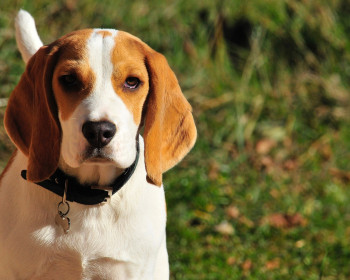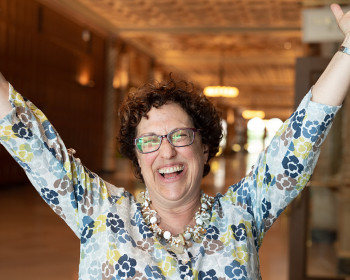Professor Russ Mead Mentors Ugandan LLM Candidate Gladys Kamsanyu Through Creation of Animal Protection Nonprofit
Open gallery

At the Center for Animal Law Studies (CALS), we welcome lawyers from around the globe who are interested in specializing in animal law. After studying animal law with us, our students take the expertise they acquire in animal law back to their country of origin and start animal law there. We are always particularly proud when one of our Animal Law LLM students starts their own nonprofit or non-governmental organization in their home country. During her time studying at CALS, Animal Law LLM Candidate Gladys Kamasanyu started a nonprofit organization—Help African Animals—to work in her home country of Uganda. She was mentored throughout the process by Professor Russ Mead, our Shared Earth Foundation Visiting Professor, who has mentored a variety of students who have started their own nonprofit organizations. We asked Gladys and Professor Mead to share how their work together inspired this new nonprofit, and how Help African Animals will change the landscape for animals in Uganda.
Q: Russ, your Nonprofit Law course is a favorite of students at Lewis & Clark Law School. Why do you believe it’s important for animal lawyers to have a deep understanding of nonprofit law, and what is your favorite thing about teaching the course?
A: There are three reasons to learn nonprofit animal law. Lawyers working for a nonprofit do a better job with nonprofit animal law training. Lawyers volunteering for a nonprofit will see ways to keep the nonprofit out of legal trouble. Lawyers with ideas of how to help animals need to learn how to create a new nonprofit to carry out their vision.
Most students in these classes have existing connections to animal nonprofits. Some students volunteer at a local rescue. Others have worked on campaigns to pass animal protection laws. And often, students have already founded or held leadership positions in animal-related nongovernmental organizations (NGOs) and nonprofits. The most exciting part of this class is what happens in the classroom. Students’ experiences become the starting point for our class discussions. The discussions are lively. The experiences shared are real. The topics are relevant.
But the most rewarding work I do every semester is working with students like Gladys to mentor them through the process of forming a new nonprofit.
Q: Gladys, you took Russ’s Legislative Drafting & Lobbying course during the spring semester. Please tell us about your experience taking the course.
A: The course is such a practical one. It gives students a chance to acquire skills in legislative drafting, lobbying legislators to support bills, website designing, making posters, video recording, and many others, all of which are crucial in animal protection.
The course gave me a chance to discover how much potential I have and can contribute to better animal protection. I am confident that I can go out and make an impact in the field of animal law.
It is a course that animal law students should not miss!
Q: Over the years, Russ, you have mentored numerous students to help them navigate the process of starting their own nonprofit organization. Do you know how many students you’ve helped? What type of work are those nonprofits now doing for animals?
A: In most semesters, I am mentoring at least one student who is creating a new nonprofit. Together we turn the student’s dreams of helping animals into a reality. Students also come into the program with an existing nonprofit that has organizational issues. Together we work to “fix” those entities rather than starting a new one. Some students want to take on a project, but want to do so individually as an “animal lawyer.” We work together to create these projects.
I don’t keep track of the students, the nonprofits, or the projects that flow through CALS. I focus on whoever is standing in front of me, asking for guidance on any given day. Students have a wide range of ideas on how to help animals. International NGO’s dealing with wildlife issues, dog and cat rescues, improving the lives of street animals, creating educational programs, reducing euthanasia rates, legislative campaigns, and vegan outreach all come to mind.
What I do know is every year at the Animal Law Conference, around a half a dozen prior students seek me out. Previous students say now that they are out in the world; they continuously use what they learned in my classes. Empowering animal advocates is what I love most about being a part of CALS.
Q: Gladys, how did you come up with the idea to start a Ugandan animal protection nonprofit, and what do you hope to accomplish through the founding of Help African Animals?
A: My passion for animal protection and my desire to increase awareness about animal law drew me into starting Help African Animals. I felt that I was not doing enough to protect animals. With a nonprofit I am confident that there is no limit on how much I can do to protect animals.
Help African Animals hopes to educate Uganda’s judges, magistrates, prosecutors, law enforcement officers, students and the general public about the laws protecting African animals living in Uganda, wildlife crimes and other crimes against animals, their nature and effect. We specifically intend to:
- Organize Animal Law workshops for judges, magistrates, prosecutors and law enforcement officers where we will educate them about the different laws that protect animals in Uganda, the offences created under the laws, how to prove those offences, exhibit handling, trial preparation, examining witnesses, making opening and closing statements, penalties provided by the laws, and the effect of wildlife crimes and other crimes against animals.
- Hold community wildlife talks through which we will travel to villages and meet the true keepers of wildlife in Uganda - the rural people, and educate them about the laws protecting animals and the penalties for violation of those laws, wildlife crime, the importance of wildlife and how to conserve wildlife in their areas.
- Distribute copies of a compendium containing all animal protection laws in Uganda. We intend to compile all laws protecting animals in Uganda and distribute them to all the criminal justice stakeholders, institutions of learning and the general public.
- Make and distribute posters that educate people about wildlife crime, crimes against animals, the laws protecting wildlife and penalties for their violation.
Q: Russ, you mentored Gladys through the process to start Help African Animals. Can you give a broad overview of what that guidance entailed?
A: The process starts by hearing a student’s hopes and dreams. I ask, “What kind of work would you do if you could do anything to help the animals?” Next, I work to instill the confidence to take this dream and make it a part of their daily lives. Then we start down the road of doing all the steps necessary to create an NGO, nonprofit, or project, with the student completing the work and me mentoring the student through the process. There are dozens of steps required to breathe life into a new entity. The student must draft the state incorporation documents, protect intellectual property, apply for IRS 501(c)(3) status. Then come the practical tasks: establish a banking relationship, open a PayPal account, create a web page and Facebook page, connect with the world through a blog, and create promotional materials.
When finished, the student is the executive director of a nonprofit. This entity is ready to take on any project that burns deep inside of the founder.
Q: Gladys, as a Ugandan magistrate judge in the wildlife courts, you have a unique view of how animals are being treated in Uganda. What are the most pressing animal protection issues in Uganda? How will Help African Animals address them?
A: The most pressing animal protection issues in Uganda include:
- Increased poaching;
- Illegal wildlife trade;
- Human-wildlife conflicts;
- Habitat loss due to human activities;
- Unregulated slaughter houses;
- Inhumane transportation of animals; and
- Outdated animal protection laws
Help African Animals will address the above issues by:
- Educating the judges, magistrates, prosecutors, law enforcement officers and the general public about the laws protecting animals and penalties for their violation, wildlife crime and crimes against animals, their nature and effect.
- Supporting the Uganda Wildlife Authority in strengthening law enforcement around protected areas.
- Educating the key criminal justice stakeholders about the dangers of illegal wildlife trade and how to dismantle trafficking networks.
- Educating rural people on the importance of conservation and how to protect wildlife in their communities.
- Supporting communities living near protected areas to engage in friendly land uses and projects such as bee keeping, hot pepper growing, and others.
- Lobbying for enactment of stronger animal protection laws.
Q: Russ, you must be so proud of the work of students, like Gladys, who transform classroom lessons into action! Do you have any advice for lawyers out there who are interested in starting an animal protection nonprofit organization?
A: I am particularly proud of Gladys! It took a lot of work to obtain the US 501(c)(3) tax-exempt status for an entity working in Uganda. Some weeks we met every day. Also, Gladys launched the first project while still in the Animal Law LLM Program at CALS in Portland.
I want lawyer advocates to know that it is within their reach to create a nonprofit. I also want lawyers to see that they can take on any animal project once they create a nonprofit. Any project! You want to pass a law to help animals? Write the bill, and use the nonprofit to organize the community and get that law passed. Want to educate the world on wildlife laws? Create an international educational program, and launch it through your NGO. Want to fight CAFO’s? Fight through a farm animal focus nonprofit. Want to end puppy mills? A nonprofit is the vehicle to use. I could make a list that is pages long of all the projects a lawyer advocate can take on through one of these animal-related nonprofits.
Q: You have said that the opportunity of studying in our Animal Law LLM Program helped to shape your thinking and focus, Gladys. How so?
A: The Animal Law LLM Program enabled me to acquire new knowledge in animal protection. I got more interested in substantially contributing to animal protection. I kept thinking about how I could be of more use than just a judicial officer after school. I found out that with a nonprofit, there was no limit to what I could do to contribute to animal protection in my country.
Q: Russ, any parting advice for students, like Gladys, who want to make transformational change for animals?
A: Law students ask, “How do I break into animal law?” My answer is always the same. What is the project of YOUR dreams? Answer that question, then start your project. If you need a nonprofit to work through, create the nonprofit. If you need 50 volunteers, start gathering people to help you. Whatever you need, go out and get it. Everything extraordinary starts with one person and a vision. As a lawyer, you can be that person. With your CALS training, you can provide that vision!
For more information about Help African Animals, please visit: www.helpafricananimals.org or email info@helpafricananimals.org.
About the Center for Animal Law Studies
The Center for Animal Law Studies (CALS) was founded in 2008 with a mission to educate the next generation of animal law attorneys and advance animal protection through the law. With vision and bold risk-taking, CALS has since developed into a world-renowned animal law epicenter, with the most comprehensive animal law curriculum offered anywhere. In addition, CALS is the only program that offers an advanced legal degree in animal law and three specialty Animal Law Clinics. CALS is a nonprofit organization and is only able to provide these educational opportunities through donations and grants.
More Center for Animal Law Studies Stories
Center for Animal Law Studies is located in Wood Hall on the Law Campus.
MSC: 51
email cals@lclark.edu
voice 503-768-6960
Center for Animal Law Studies
Lewis & Clark Law School
10101 S. Terwilliger Boulevard MSC 51
Portland OR 97219

